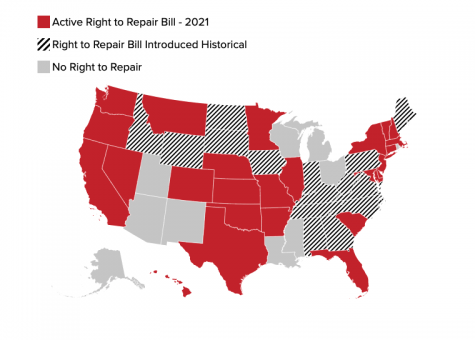Why are Cell Phones so expensive to repair?

Credit: Wikipedia Commons
One of the most common devices that humans have right now is a cell phone. Cell phones originally began to appear in the early 2000s, and, over the last two decades, their popularity has only increased. I recently ran a poll on the Parks Panther Press website, and out of the 20 people that responded, only 2 didn’t have a cell phone. When they were first invented, cell phones were highly repairable. In fact, many older cell phones had batteries that you could completely remove and replace without any tools. However, modern-day cell phones are a lot less repairable. While many point to the fact that cell phones are a lot more complex than 20 years ago, and that is true, it is not just that. As you dig deeper into this question, it seems as if the high costs and “complexity” of repair are placed there on purpose.
To start off this article, I would like to talk about the most common ways that people can get their phones repaired. I’m going to use Apple (the makers of the iPhone) as an example here, but this can apply to many different cell phone and technology companies. While many of these companies, like Apple, have their own repair services called “Genius Bars” to repair a device, only allowing Apple to repair these devices would make it a monopoly. So, for private, local repair shops that want to gain access to Apple’s internal information, training, and replacement parts, they can become Apple Certified. However, this isn’t as straightforward as it seems. These small shops have to pay a fee to become certified, log every replacement that they do, and they are even limited to the types of repairs that they can make. All of these factors make becoming an Apple-Certifed Repair Shop a bad business decision for these independent shops.
However, the situation gets worse. Louis Rossmann, an independent iPhone repair shop owner and Technology Youtuber, said in one of his Youtube videos, regarding Apple’s Independent Repair Program, “This program is virtually useless because they put a lot of barriers in place to keep new people from being able to sign up.” He also pointed out that the prices for screens frequently cost more than the phone and said, “Above all, they don’t do anything besides Batteries and Screens for only iPhones.” He then went on to list some of the terms that these independent repair shops would have to agree to. “Repair shops have to agree to unannounced audits and inspections by Apple to determine if they’re using prohibited repair components which can result in fines. … Even if a shop leaves the program Apple can continue to inspect it for up to five years.” This clearly shows a purposeful attack on these independent repair shops, but keep in mind that this is not only Apple doing this. There are several other instances of other cell phone and technology companies doing similar behaviours.
Now, you might be asking “Why would a company, especially one that is this big, do this?”, and the answer is quite simple. The cost for a replacement screen is a lot less than the cost of a brand new phone, meaning that if a company can convince you to buy the more expensive product, then they can make more money off of it. This can also be very hurtful to the environment as perfectly functioning electronics could turn into electronic waste, all because a company wanted to sell you a new phone.
Now, many people will argue that these behaviours are warranted because technology is getting more complicated, and therefore harder to repair, and that, because of this, the actions of these companies are justified to protect consumers from bad repairs and the name of the company. I believe that this stance is completely justified. As technology gets more advanced, it should get more difficult to repair a device. However, there is a large difference between the types of repair that are difficult because of technological advancement, and the types of repair that are difficult because a company made it that way, as seen with the quotes provided above.
And luckily, there is a movement that could bring an end to all of this: Right to Repair. Right to Repair is quite a simple concept; if you own a piece of technology, you should be able to repair it. This can be passed as law either in a state, or as a nationwide bill, and many states do already have the Right to Repair Legislation, as seen on the chart below. However, a nationwide law would set common guidelines for the entire nation, ensuring that a few states don’t have poorly written laws. And one day, this absolute fiasco caused by corporate greed might finally come to a close.

If you are interested in learning more about Louis Rossmann and his other experiences with Apple’s Independent Repair Program, you can find them on his Youtube Channel, which is here.
I used a lot of information and examples from Marques Brownlee’s video on Right to Repair, which you can find here.
If you would like to learn more about Right to Repair Laws and Legislation, you can head to Repair.org

Aiden is a 14-year-old 8th grader at Parks Jr. High. Like many people, he spends a lot of time online and playing video games. His favorite video game...















